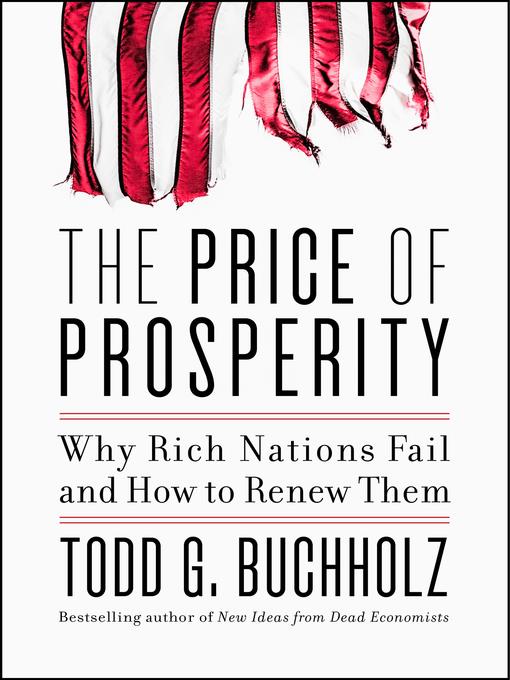
The Price of Prosperity
Why Rich Nations Fail and How to Renew Them
کتاب های مرتبط
- اطلاعات
- نقد و بررسی
- دیدگاه کاربران
نقد و بررسی

April 25, 2016
Buchholz, director of economic policy in the George H.W. Bush White House, examines the forces that threaten to bring down wealthy countries, observing of the modern-day U.S., that “it is hard to get a country to ‘rally around the flag’ when everyone stomps off in his or her own direction.” He states that it’s a dangerous mistake to think societies are invincible just because they have wealth, citing the Ottoman and Austro-Hungarian Empires to show that great wealth will not necessarily protect a regime. In search of examples of strong leadership, he turns to Alexander the Great, Japan’s Meiji Restoration, Israeli prime minister Golda Meir, and Costa Rican president José Figueres Ferrer, among others. He also draws a grim picture of the U.S. as a country hamstrung by an aging populace, trade deficits, debt, a suffering work ethic, and loss of national identity. Buchholz charges that Americans no longer identify as Americans first, but he neatly avoids the trap of whining about the decline of patriotism, focusing instead on quantifiable social and economic change. Some sketched-out solutions are offered, but overall this is less a rallying cry than an interesting view on what makes—and breaks—a wealthy nation. Agent: Susan Ginsburg, Writers House.

May 1, 2016
How to renew the greatness of rich but potentially failing nations, like the United States.With a background as a hedge fund manager and the director of economic policy in George H.W. Bush's administration, Buchholz (Rush: Why You Need and Love the Rat Race, 2011, etc.) has the credentials to address the reasons why prosperous countries decline and to provide solid ideas on the cultural and political choices required to change course. "Working to shatter nations" are forces such as falling birth rates, rising debt, and declining work ethics, which the author believes threaten the United States and much of Europe. An advocate of free markets, his views are not readily pigeonholed in the usual ideological categories. He supports immigration and assimilation through the culture and values of the host country. Decline, he argues, stems "from the prosperity delivered by market capitalism." As he notes, "the rise of science and the Enlightenment catapulted societies into a new world of economic growth and opportunity." People grew taller and healthier and lived longer, and they built cities to live in. The author's objective is to learn from how past leaders have dealt with similar problems and the associated cultural pessimism. He believes that it is important to "kick aside conventional wisdom," dismantle special privileges, whether of money or birth, and know "how to touch the hearts of their people." As examples of those people, he offers Alexander the Great; Kemal Ataturk, the founder of modern, secular, Turkey; Golda Meir, one of the pioneer builder-settlers of Israel; Sakamoto Ryoma and other organizers of Japan's 19th-century opening to Western science and technology; and Jose Figueres Ferrer, architect of Costa Rica's independence. Each of these figures, writes Buchholz, realized "that money and genetics were not enough"; they also needed to restore lost senses of pride, honor, and purpose. A refreshing book that offers an alternative to the failing shibboleths of the day.
COPYRIGHT(2016) Kirkus Reviews, ALL RIGHTS RESERVED.

May 1, 2016
Buchholz, a former White House director of economic policy, hedge fund managing director, and author (New Ideas from Dead Economists), worries that prosperous nations such as the United States tend to splinter from within. He says national success breeds decline and cites examples such as the ancient Spartans, medieval Venice, and the Austro-Hungarian Empire. The first half of the book presents five driving forces that weaken rich nations: declining birthrates, disruptive global trade, rising debt loads, eroding work ethic, and the dilemma of preserving patriotism in growing multicultural societies. The second part shows how solutions can be found in transformative leadership, providing examples from history such as Alexander the Great, Turkey's Mustafa Kemal Ataturk, the Meiji Revolution in Japan, Don Pepe of Costa Rica, and Israel's Golda Meir. Buchholz concludes by prescribing specific policies to ameliorate the negative forces he has identified. His broad advice is for leaders to instill in all citizens a shared sense of national history and culture. VERDICT Targeting a general audience with clarity and humor, Buchholz's insights will interest readers concerned about sustaining national unity. [See Prepub Alert, 12/7/15.]--Lawrence Maxted, Gannon Univ. Lib., Erie, PA
Copyright 2016 Library Journal, LLC Used with permission.

January 1, 2016
White House director of economic policy under President George H.W. Bush, Buchholz sees America as tumbling downward owing to partisanship, immigration fears, a discouraging job market, and a loss of community and patriotic spirit. Here are recommendations for renewal.
Copyright 2016 Library Journal, LLC Used with permission.

























دیدگاه کاربران